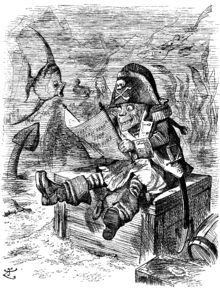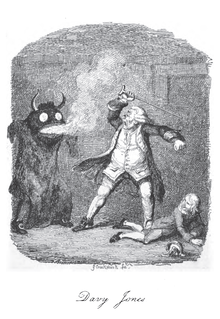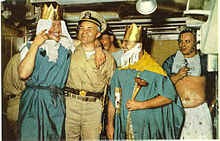- Davy Jones' Locker
-
This article is about the nautical legend of Davy Jones. For the character as portrayed in the Pirates of the Caribbean film series, see Davy Jones (Pirates of the Caribbean).
Davy Jones's Locker 
Davy Jones's Locker, by John Tenniel, 1892Genre Nautical folklore Type Euphemism for sea floor, or resting place for sailors drowned at sea.  Davy Jones pictured by George Cruikshank in 1832, as described by Tobias Smollett in The Adventures of Peregrine Pickle[1]
Davy Jones pictured by George Cruikshank in 1832, as described by Tobias Smollett in The Adventures of Peregrine Pickle[1]
Davy Jones's Locker is an idiom for the bottom of the sea: the state of death among drowned sailors. It is used as an euphemism for death at sea (to be sent to Davy Jones's Locker).[2] The origins of the name are unclear and many theories have been put forth, including incompetent sailors, a pub owner who kidnapped sailors, or that Davy Jones is another name for the devil—as in "Devil Jonah." This nautical superstition was popularized in the 19th century.[3]
Contents
History
The earliest known reference of the negative connotation of Davy Jones occurs in the "Four Years Voyages of Capt. George Roberts", by the author Daniel Defoe, published in 1726 in London.
Some of Loe's Company said, They would look out some things, and give me along with me when I was going away; but Ruffel told them, they should not, for he would toss them all into Davy Jones' Locker if they did.—Daniel Defoe[citation needed]An early description of Davy Jones occurs in Tobias Smollett's The Adventures of Peregrine Pickle, published in 1751:[3]
This same Davy Jones, according to sailors, is the fiend that presides over all the evil spirits of the deep, and is often seen in various shapes, perching among the rigging on the eve of hurricanes:, ship-wrecks, and other disasters to which sea-faring life is exposed, warning the devoted wretch of death and woe.—Tobias Smollett, [3]In the story Jones is described as having saucer eyes, three rows of teeth, horns, a tail, and blue smoke coming from his nostrils.
Theories
The origin of the tale of "Davy Jones" is unclear, and many explanations have been proposed:
- He was Vanderdecken ('of the decks'), the captain of the ghost ship the Flying Dutchman.
- There was an actual David Jones, who was a pirate on the Indian Ocean in the 1630s,[4] but most scholars agree that he was not renowned enough to gain such lasting global fame.[5]
- A British pub owner who is referenced in the 1594 song "Jones's Ale is Newe." He may be the same pub owner who supposedly threw drunken sailors into his ale locker and then dumped them onto any passing ship.[5]
- He could also be Duffer Jones, a notoriously myopic sailor who often found himself over-board.[6]
- Welsh sailors who would call upon Saint David for protection in times of mortal danger, though this is unlikely as the Welsh have always used the saint's Welsh name Dewi. Although "Dewi" spoken with a heavy Welsh accent may sound very close to "Davy"[5]
- Some also think it is simply another name for Satan.[5]
- The name may have come from Deva (Hindu), Taffy (derogatory term for Welsh people used in rhymes that depict Welsh people as thieves and liars), or the thief of the evil spirit.[citation needed]
- Davy may also stem from Duppy, a West Indian term for a malevolent ghost.
- There is also the "Jonah" theory, Jonah became the "evil angel" of all sailors, as the biblical story of Jonah involved his shipmates realizing Jonah was being punished for his disobedience to God and casting him over-board. Naturally, sailors of previous centuries would identify more with the beset-upon ship-mates of Jonah than with the unfortunate man himself. It is therefore a possibility that "Davy Jones" grew from the root "Devil Jonah" – the devil of the seas. Upon death, a wicked sailor's body supposedly went to Davy Jones's locker (a chest, as lockers were back then), but a pious sailor's soul went to Fiddler's Green.[5]
Reputation
 Crossing the equator ceremony with "Davy Jones" (to left of Captain with plunger as sceptre) aboard the USS Triton, 24 February 1960 as part of the Operation Sandblast cruise
Crossing the equator ceremony with "Davy Jones" (to left of Captain with plunger as sceptre) aboard the USS Triton, 24 February 1960 as part of the Operation Sandblast cruise
The tale of Davy Jones causes fear among sailors, who may refuse to discuss Davy Jones in any great detail.[5] Not all traditions dealing with Davy Jones are fearful. In traditions associated with sailors crossing the Equatorial line, there was a "raucous and rowdy" initiation presided over by those who had crossed the line before, known as shellbacks, or Sons of Neptune. The eldest shellback was called King Neptune, and the next eldest was his assistant who was called Davy Jones.[5]
Use in media
19th century
In 1824 Washington Irving mentions Jones's name in his Adventures of the Black Fisherman:
He came, said he, in a storm, and he went in a storm; he came in the night, and he went in the night; he came nobody knows whence, and he has gone nobody knows where. For aught I know he has gone to sea once more on his chest, and may land to bother some people on the other side of the world; though it is a thousand pities, added he, if he has gone to Davy Jones's locker.In Edgar Allan Poe's "King Pest" of 1835, Davy Jones is referred to dismissively by the anti-hero, Tarpaulin, when King Pest refers to "that unearthly sovereign" "whose name is Death." Tarpaulin responds, "Whose name is Davy Jones!"[8]
Herman Melville mentions Jones in the 1851 classic Moby-Dick:
There was young Nat Swaine, once the bravest boat-header out of all Nantucket and the Vineyard; he joined the meeting, and never came to good. He got so frightened about his plaguy soul, that he shrinked and sheered away from the whales, for fear of after-claps, in case he got stove and went to Davy Jones.In Charles Dickens's Bleak House (1852–1853), the character Mrs. Badger quotes her former husband's work ethic, portraying Davy Jones in a formidable light:
"It was a maxim of Captain Swosser's", said Mrs. Badger, "speaking in his figurative naval manner, that when you make pitch hot, you cannot make it too hot; and that if you only have to swab a plank, you should swab it as if Davy Jones were after you."In Robert Louis Stevenson's 1883 novel Treasure Island, Davy Jones appears three times, for example in the phrase “in the name of Davy Jones”.[11][12]
20th century
In J. M. Barrie's 1904 play and 1911 novel Peter and Wendy, Captain Hook sings a song:
Yo ho, yo ho, the pirate life,
The flag o' skull and bones,
A merry hour, a hempen rope,
And hey for Davy Jones.In Tintin and the Prisoners of the Sun Captain Haddock says "Davy Jones, here I come!", before passing through a waterfall.
The Current US Navy song "Anchors Aweigh" refers to Davy Jones in its current lyrics adopted in the 1920s:
Stand, Navy, out to sea, Fight our battle cry;
We'll never change our course, So vicious foe
steer shy-y-y-y.
Roll out the TNT, Anchors Aweigh.
Sail on to victory
And sink their bones to Davy Jones, hooray!
Anchors Aweigh, my boys, Anchors Aweigh.
Farewell to foreign shores, we sail at break of day-ay-ay-ay.
Through our last night on shore, drink to the foam,
Until we meet once more,
Here's wishing you a happy voyage home.—[14]Paul McCartney's song Morse Moose And The Grey Goose refers to Davy Jones in the last verse:
She flew into the stormy sea
Davy Jones was calling me
But heading for tranquillity
The grey goose flew away.It is also referenced in the song Rhymin and Stealin by the Beastie Boys off their Licensed to Ill album in this verse:
I've been drinking my rum - a Def son of a gun
I fought the law and I cold won
Black Beard's weak - Moby Dick's on the tick
'Cause I pull out the jammy and squeeze off six
My pistol is loaded - I shot Betty Crocker
Deliver Colonel Sanders down to Davy Jones' locker
Rhymin' and stealin' in a drunken state
And I'll be rockin' my rhymes all the way to Hell's gate21st century
The Amber Spyglass, the third book in Philip Pullman's His Dark Materials trilogy, mentions "Davey Jones's locker" in the tall tale Lyra told her party's hosts in the town for live humans before the river crossing to the land of the dead.
The concept of Davy Jones was conflated with the legend of the Flying Dutchman in the Pirates of the Caribbean film series, in which Davy Jones' locker is portrayed as a sort of purgatory. The term has also been used repeatedly in the animated TV series SpongeBob SquarePants to represent an actual locker in the bottom of the sea where Davy Jones (of the Monkees fame) keeps his gym socks.[15]
In One Piece, there's a game in honor of Davy Jones: the Davy Back Fight.
References
- ^ However, presented here character is a fake, created by Pipes, Perry and Pickle to scare Mr. Trunnion; see: Smollett, Tobias (1751). The Adventures of Peregrine Pickle. London: D. Wilson. p. 66.
- ^ "Davy Jones’s Locker". Bartleby.com. The American Heritage Dictionary of the English Language: Fourth Edition.. 2000-01-01. http://www.bartleby.com/61/29/D0042900.html. Retrieved 2006-07-16.
- ^ a b c Brewer, E. Cobham (1898-01-01). "Davy Jones’ Locker.". Dictionary of Phrase and Fable. http://www.bartleby.com/81/4705.html. Retrieved 2006-04-30.
- ^ Rogoziński, Jan (1997-01-01). The Wordsworth Dictionary of Pirates. Hertfordshire. ISBN 1-85326-384-2.
- ^ a b c d e f g h Dunne, Susan (2006-07-07). "Davy Jones Legacy". The Hartford Courant. http://www.courant.com/features/lifestyle/hc-davyjoneslocker.artjul07,0,7310662.story?coll=hc-headlines-life. Retrieved 2006-09-30.
- ^ Shay, Frank. A Sailor's Treasury. Norton. ASIN B0007DNHZ0.
- ^ Irving, Washington. "Adventure of the Black Fisherman". Free Online Library. http://irving.thefreelibrary.com/Adventure-of-the-Black-Fisherman. Retrieved 2010-03-17.
- ^ Poe, Edgar Allan (1835) "s:King Pest"
- ^ Melville, Herman (1851) s:Moby-Dick/Chapter 18
- ^ The Oxford Illustrated Dickens page 229
- ^ Stevenson, Robert Louis (1883) s:Treasure Island/Chapter 22
- ^ Stevenson, Robert Louis (1883) s:Treasure Island/Chapter 20
- ^ Barrie, J. M. (1904 and 1911) s:Peter and Wendy/Chapter 15
- ^ "Davy Jones' Locker". http://en.spongepedia.bimserver2.com/index.php?title=Davy_Jones%27_Locker. Retrieved 2010-03-17.
Categories:- Nautical lore
- English folklore
- American folklore
- Superstitions
Wikimedia Foundation. 2010.

